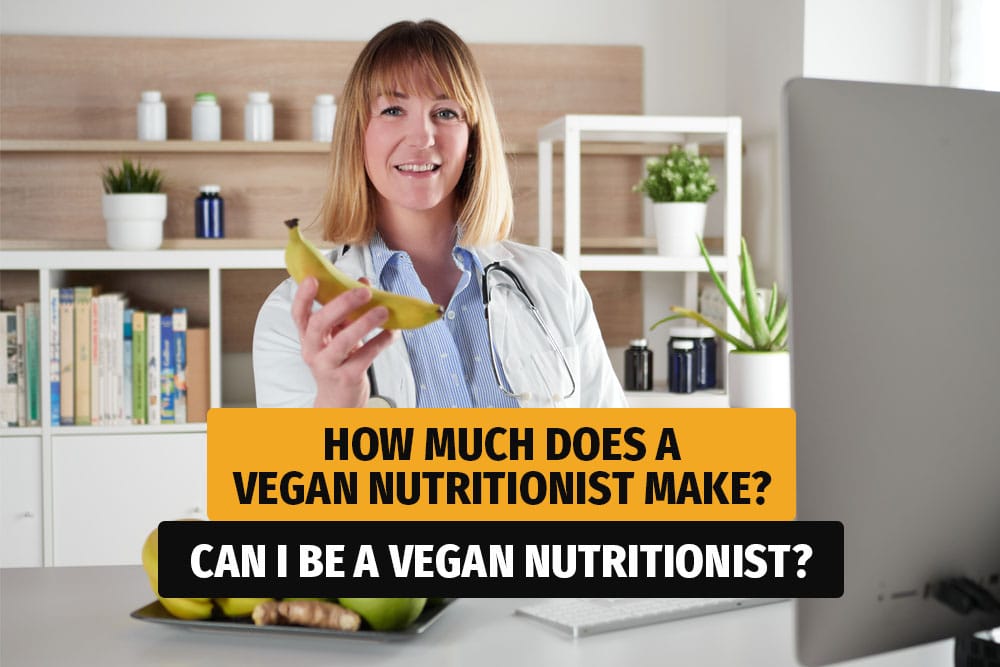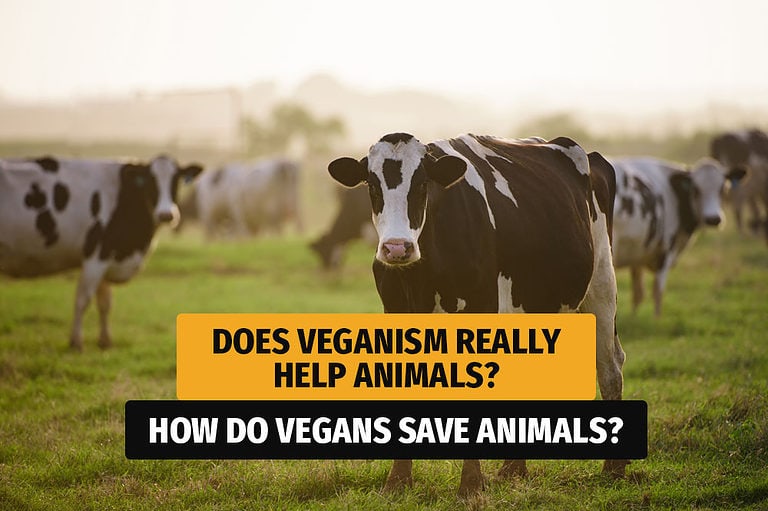
If you’re thinking about being a vegan nutritionist, one of the first questions you’ll need to get answered is, how much does a vegan nutritionist make? Can you make enough money to make a good living?
On average, a vegan Nutritionist can make between $29k and $80k. If a vegan nutritionist has more experience and better education he will be on the higher end, around $80k and those that are just starting out might be on the lower end, around $25k.
I didn’t make this post to brag about how much money a vegan nutritionist makes — that’s all over the internet, so I’m not going to do it. I’m going to cover other, frequently asked questions related to the vegan nutritionist job.
What is a Vegan Nutritionist?
You probably know what nutritionists are and you probably have an idea what is a vegan nutritionist. And you are probably right at your presumption.
Vegan nutritionists are nutritionists specialized in vegan diets and often work with people to educate them about vegan nutrition, diet, and health.
Vegan diets that are well-planned and balanced can satisfy all dietary needs for all stages of human life. Plant-based diet is high in vitamin E, magnesium, fiber, vitamin C, folic acid, phytochemicals, and iron while being lower in cholesterol, saturated fat, calories, vitamin D, and vitamin B12.

You might find this interesting:
Why do vegans need to take B12 suplements?
According to the Nutritionist of Canada and the American Academy of Nutrition & Dietetics, vegan diets are suitable for all periods of life, such as pregnancy, nursing, infancy, childhood, and teenagers.
The main focus of vegan nutritionists is on eating behavior and nutrition in order to educate individuals on how to consume a plant-based diet to maximize nutritional benefits and personal goals.
This includes collaborating with people to develop and carry out meal plans that enhance the nutrition of the individual or family. To customize a vegan diet to each person’s needs, plant-based nutritionists concentrate on general health issues, vitamin shortages, eating disorders, pregnancy nutrition, vegan kids’ nutrition, food allergies, sports nutrition, and more.
In light of this, each vegan nutritionist provides special suggestions for incorporating a plant-based diet for distinct individuals with various requirements.
What Does a Vegan Nutritionist Do?
Vegans dedicate their lives to not consuming any animal products. We, therefore, refrain from consuming dairy, eggs, and meat. Instead, we choose to eat wholesome foods, such as fruits, vegetables, and legumes.
When living in a world where processed foods, fast food, and restaurant eating are the norm, sticking to a diet that might go against this, can be challenging.
Vegan nutritionists can help with that.
A vegan nutritionist provides guidance to patients who want to adopt a vegan lifestyle. However, a vegan nutritionist does more than just jot down meal recommendations. They advise their patients on the vegan diet because they believe it’s the healthiest option, and there are plenty of studies that back up that notion.
This is a general explanation of what a vegan nutritionist does. But wait, there are some more fine details to it.
Nutritionist’s aim is to raise the general well-being of his patients. It’s important to listen to patient’s needs because every patient has a unique objective. Whether the objective is to heal from surgery, improve mobility, improve memory, or lower cholesterol, a nutritionist has a plan.
Increasing energy, decreasing reliance on drugs, preventing disease, and losing weight are additional popular objectives of a vegan nutritionist.
It might seem to be an easy job, but it is far from it.
When advising patients, there are several things to think about. A nutritionist must have a complete awareness of their medical background, way of life, objectives, and even their dietary and animal-related beliefs.
Nutritionists have to carry out broad surveys and meticulously examine eating patterns to acquire that data.
Vegan nutritionist’s area of expertise is knowing how the composition of each type of food affects the body. This way they can design meal plans that fight off particular diseases.
For example, a patient sees a vegetable when he looks at a snap pea. For a nutritionist, that same pea is something deeper, something that contains certain vitamins, has a certain sugar content, and digestion times. Knowing how to use this information, enables a nutritionist to enhance and perhaps even lengthen the lives of your patients.
A vegan nutritionist can also assist in the following ways:
- Explain the numerous positive outcomes of adopting a vegan diet for your health, as well as any drawbacks and cautions you should be aware of.
- Assist people in making the shift from other diets to a vegan diet.
- Give ideas for vegan-friendly meals, snacks, and recipes.
- Specify vegan foods, including their brand names.
- If available, share vegan alternatives to your favorite foods.
How Much Does a Vegan Nutritionist Cost?
Depending on the nutritionist you choose, whether it is your first or follow-up appointment, and whether you are paying as you go, receiving coaching, or purchasing a package, the cost of a session with a vegan nutritionist ranges from $80 to $250.
You can also contact (through phone call or email) your local vegan nutritionist for the complete list of fees since costs may vary depending also on the location.
Can I Be a Vegan Nutritionist?
Yes, you can if you have passion, opportunities, and interest in this field you definitely become a vegan nutritionist.
In fact, nutritionist jobs have become very popular in the last 10 years all over the world. It is something anybody that has a desire to learn, can accomplish.
Do You Have to Be Certified to Be a Nutritionist?
There are different ways to become a nutritionist:
Clinical Nutritionist (CN)
Only 19 states had clinical nutritionist licensing requirements as of 2019. Anyone who has a genuine interest in diet and nutrition can proclaim themselves a “nutritionist” in states that don’t restrict the usage of the term.
Uncredentialed nutritionists, however, are unlikely to work in a hospital or research facility. It is more typical for nutritionists to pursue further education and licensure as a CCN or CNS.
Certified Clinical Nutritionist (CCN)
A CCN (Certified Clinical Nutritionist) employs its strong biochemical science base to examine a client’s physical health, family or medical history, and lifestyle in order to achieve maximum health.
In addition to the patient’s case history, they also employ assessments like laboratory tests to determine the best course of treatment. Their assessment may also serve as the foundation for a physician referral. They are also qualified for research and development positions with companies that manufacture nutraceuticals and supplements.
A bachelor’s degree in science from a recognized university is the minimal educational requirement for Certified Clinical Nutritionists. They must have studied microbiology, chemistry, nutrition, human biology, and anatomy.
The CCN exam is also open to graduates with a master’s degree in nutrition. MD, DO, or BS in nursing holders must complete 56 hours of online clinical human nutrition training to take the CCN exam.
For you to become a CCN, your state’s certified nutritionist requirements may additionally include a 900-hour internship.
CCN certification is obtained after passing a 150-question, multiple-choice certification exam.
CCNs are required to retake the certification exam every five years and complete a continuing forty hours of education every two years.
Certified Nutrition Specialist (CNS)
Advanced, credentialed professionals that extensively collaborate with their patients to improve their diets are known as Certified Nutrition Specialists.
They are competent to work with patients who have been given a diagnosis of disordered eating as well as obesity, hypertension, diabetes, and heart disease. They can also give advice and teaching about nutrition to government organizations, rehabilitation centers, and community programs.
The most demanding requirements of any nutritional expert must be met by those who obtain the CNS board certification. As a result, CNSs are highly sought-after and esteemed by employers.
How Do I Become a Vegan Nutritionist?
To become an RD (Registered Dietitian), follow these steps:
- Complete a bachelor’s degree program at an authorized institution.
- Complete a post-degree diploma or Masters/practicum program.
- Pass the national registration exam (the CDRE).
Although plant-based diets will be covered in most degrees at some point, sadly, they will only make up a small portion of your coursework. You won’t learn enough from this to be capable of assisting people who follow a plant-based diet.
Fortunately, there is a plethora of information available in the field of plant-based nutrition that you may use to advance your abilities as a vegan dietitian.
Here are our top five tips for improving yourself while pursuing your degree and after you graduate:
- Volunteering and Work Experience. Work experience and volunteerism are two of the best ways for a student dietitian or recent graduate to improve and apply their clinical knowledge. The greatest method to gain a practical understanding of dietetics outside of university is to do this.
This could entail writing blog articles, making content for social media, helping out with administrative duties, or taking advantage of professional development opportunities.
Make the most of your relationship with a vegan dietitian once you’ve secured a volunteer opportunity by getting as many questions answered as you can. Additionally, it is always a good idea to ask about their willingness to let you observe a couple of their sessions. This is the most effective way to obtain advice for your own practice.
Although frequently unpaid, helping out other dietitians as a volunteer develops vital skills and information that may one day lead to a paid job in the field.
- Keep track of new research and watch out for courses that will help you with your professional development.
- Familiarize oneself with key figures, documentaries, and plant-based diets.
How Long Does it Take to Become a Vegan Nutritionist?
To become a vegan nutritionist, you must complete a home-based Vegan Nutritionist Diploma Course, which can take up to 150 hours to complete. This course has no time constraints and can be completed at your own convenience.
Now that you know how long does it take to become a vegan nutritionist, will you consider becoming one?
Conclusion
In brief, a vegan nutritionist may be able to impact the health of an entire community by educating them on how to transition to a plant-based diet and lose weight. If you’re interested in this field, make sure you know what your options are when it comes to certifications, training, job opportunities, and salary.
I hope I helped you with these insights about vegan nutritionists and I wish you the best of luck if you decide to go down that road.
If you enjoyed this piece, please, be sure to share it with others! If you have any other questions about vegan nutritionists, feel free to contact me.




